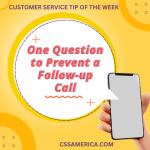We always say that the 3 Drivers of Customer Satisfaction in ANY business are the Attitudes/skills/knowledge of employees, the service delivery Processes, and the Products themselves. And if you begin digging deeper into the components of Attitude, Process, and Product, you realize that Attitudes and Processes are what make up the Customer Service portion of overall Customer Satisfaction. And when you dig deeper into the Attitude piece itself, you realize that this means different things to customers of different industries.
For example, a recent study showed that the aspect of Attitude that is most important to cancer patients is compassion. More than any aspect of the Processes or Products/Services received experienced by the cancer patients as well, having “a compassionate team of care providers…access to a knowledgeable, competent physician…and…being treated as human beings…are the most important correlates with patient satisfaction.”
Why is this important to know? When you think of the hundreds of interactions that a patient and their family may have with employees and physicians on the phone, face-to-face, and via e-mail over the course of an inpatient stay and soon thereafter, when you think about all the processes the patients experience, and when you think of all the services provided to them, it’s a daunting task to try to improve EVERYTHING to have a positive impact on patient satisfaction.
Instead, if a hospital knows the primary drivers of patient satisfaction, it gives them a focus, a “bang-for-the-buck” improvement strategy, and a way to get everyone to rally around a particular aspect of the patient experience.
So think about this for your business as well. Don’t feel the need to try to improve EVERYTHING. We work with many clients including hospitals to identify – in a precise and quantitative fashion – just this: What are the 1 or 2 or 3 aspects of the customer experience with the most significant impact on their willingness to recommend you to others or to return themselves?
Find the “compassion” correlation that applies to your business and your customers.
Interested in improving your company’s customer service? See more at… http://www.cssamerica.com/





















